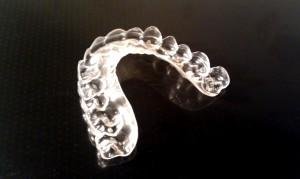Bruxism treatment in children and adults – what to do if I grit my teeth in my sleep
Bruxism has no age limit – it can appear both in childhood and in an adult. True, if it goes away with time in babies, then adults have to go to doctors and various methods of treatment. What does medicine offer today to treat a disease, or at least to eliminate its consequences?
The content of the article:
All treatments for bruxism – which doctor will help?
Treatment of “neglected” bruxism in adulthood is an extremely difficult process. And the first task is to identify the cause of the disease. Already on the basis of it, treatment is prescribed.
There are not so many methods that are used to combat this ailment:
- Physiotherapy (warming compresses, laser exposure).
- Hardware correction (approx. – wearing a special mouth guard for 3 months to correct bite defects, etc.).
- Using day / night guards (more likely a remedy against the effects of bruxism than a method of treatment).
- Psychotherapy, trainings to relieve emotional stress.
- Prevention of stress.
- Dental procedures.
- Behavioral therapy, auto-training.
- Orthopedic / orthodontic treatment.
- Drug therapy.
- Botox injections. This procedure is carried out in the most advanced case to protect the jaw muscles from spontaneous contractions by introducing Botox into it.
The diagnosis and treatment of bruxism, in accordance with the cause, is carried out by such specialists as a dentist, orthodontist, neurologist, neuropathologist, psychologist. And the earlier the disease is detected, the more chances of success are. Left unattended, bruxism (“well, they creak, and okay”) leads to erasure of tooth enamel and more serious problems.
For the prevention of the disease will be useful:
- Timely problem solving and stress relief.
- Soothing compresses and baths.
- Self-control over facial muscles.
- Regular rest from solid foods.
- Minimization of all factors that cause excitation of the nervous system.
Special mouthguards for bruxism
If the daytime form of the disease is still controllable, then it is impossible to cope with the nighttime form, which leads to damage to the jaw joints, powerful damage to the teeth, the appearance of severe pain, etc. To alleviate the condition, protect the teeth and reduce the load on the jaw joints, the doctor usually prescribes the use of mouth guards.

What it is?
The mouthguard is a silicone device with a lot of useful “options”:
- Protection of teeth from decay (and, of course, enamel from abrasion).
- Prevention of loosening / displacement of teeth.
- Reducing stress on facial muscles and jaw joints.
- Protection of braces and other devices from damage.
The cost of a mouth guard is not high, especially for the sake of peace of mind for your family at night and your health (about 2000-4000 rubles). It is not recommended to buy it at the pharmacy (in this case, you can even harm yourself). The mouthguard is made to order. How?
Mouthguard making:
- The dentist takes an individual impression of the patient’s teeth.
- Transfers this cast to a special / laboratory, where a mouthguard is made on it.
- Materials – bioplastic or biosilicone. The inner part of the mouthguard is created soft – for the comfort of the gums, and the outer, on the contrary, hard – for a long “life” of the product (taking into account the constant closing of the teeth).
What are the mouthguards for this disease? Firstly, one- and two-jaw (the second – for the most difficult cases).
Secondly…
- Daytime (tires). Accordingly, for protection during the day. They are used less often because daytime bruxism is more controlled. Wearing day trays is constant, in the mouth they are invisible and imperceptible.
- Resonant. This option is prescribed for intense bruxism. This mouth guard is used to shift the articular head of the joint and get rid of muscle spasms.
- Nightly. These mouthguards are the most popular. “Put on” them at night so that the teeth do not rub against each other and do not close.

How are mouth guards taken care of?
- Cleaning (rinsing) with water from the inside every morning.
- Cleaning the outside of the mouthguard with a toothbrush.
- Storage in a glass of water or in a special / case.
Also, the mouthguard should be regularly taken to the dentist so that he can assess its condition and, if it is unusable, prescribe a new one.
See also: An adult or child grinds his teeth in a dream – causes and treatment
Effective drugs and treatments for bruxism
First of all, it should be said that treatment for bruxism must necessarily be comprehensive, and all drugs should be used exclusively on the recommendation of a doctor.
Typically, the following treatments are performed:
- Self-help psychotherapy (relaxing massages, walks and distractions, soothing baths and other relaxation treatments).
- Psychotherapy sessions with a doctor. Usually the doctor helps the patient to find and understand the problem that worries him, as well as to cope with a difficult life situation and learn how to get rid of stress at their initial stage.
- Daytime relaxation of the chewing muscles. Throughout the day, the patient learns to relax the chewing muscles and close the teeth exclusively during the meal.
- Evening load on the chewing muscles. Or fatigue of the muscles of the jaw before bedtime. This load involves chewing gum (2-3 pieces at once), first on the right, then on the left (1 minute on each side). You should chew until the jaw is tired – before going to bed, and also 2-3 times during the day.
- Warm compresses. They are applied to the cheekbones to relieve tension and soreness.
- Relaxation massages and baths, yoga and meditation.

Medicines for bruxism – what does the doctor prescribe?
Depending on the cause, the doctor may prescribe …
- For stress: sedatives, GHB.
- Antidepressants.
- Preparations with a high content of Ca and Mg.
- To normalize the tone of the masticatory muscles: vitamins B12 and B6, Depakine and ascorbic acid, Ca and Mg, botulinum toxin type A.
- For the correction of biochemical processes: taurine, phenylalanine.
Treatment of bruxism with folk remedies
Alternative treatment methods are usually aimed at combating stress (as the most common cause of bruxism) and pain.
- Relaxing facial massage. It will be useful for any cause of illness – to relax the facial muscles. You can do it yourself.
- Baths using soothing herbs (mint, vlerian, chamomile) and aromatic oils (lavender, fir, etc.). The bath takes about 15 minutes.
- The use of decoctions (herbal preparations). Infusion of mint (2/4), hop flowers (1/4), tripoli leaves (2/4) and valerian root (1/4). Or an infusion of chamomile flowers, valerian and caraway seeds (3/2/5). Three times a day on an empty stomach.
- Eating hard fruits / vegetables, seeds, nuts before bed. This will help tire the jaw muscles. Don’t forget about chewing gum.
- Warm, moist lotions on the cheekbones. It is recommended to do them often and for as long as possible. You can use a towel soaked in warm water. But it will be more useful to moisten it in an infusion of herbs (lemon balm, chamomile, mint).
Special attention should be paid to the nutrition of a baby who has been diagnosed with bruxism. Sweets are excluded from the diet, infusions of useful herbs are introduced instead of tea and the amount of raw vegetables in the diet is increased.

Good habits for treating squeaky teeth during sleep
Tips for the prevention of bruxism come down to a few rules that are recommended to be made by your good habits:
- We avoid stress and learn to relax, be distracted and abstract.
- We avoid abundant food at night looking – we eat only light food, and before going to bed we tire the chewing muscles to the maximum through chewing apples, carrots, chewing gum, etc.
- Before going to bed, we take a bath with sedatives.
- We don’t watch horror movies at night, we don’t sit in laptops – we relax, relieve stress.
- Avoid (if possible) carbohydrate-rich foods, sweets and caffeinated drinks.
- In the evening (and during the day) we apply compresses on the cheekbones – warm and moist.
- We learn to relax the jaws and control the non-closing of the teeth – we bring this habit to automatism, so that even at night the body itself mechanically struggles with the closing of the teeth.
- Do not forget about regular walks – fresh air is essential for the nervous system.
- During the day we brew tea with chamomile, mint or lemon balm.
Of course, like any disease, bruxism requires complex treatment. Therefore, do not wait until the disease becomes neglected – consult your doctor for effective therapy.
What to give a friend?
Gift Certificate! You can give it to your loved one or use it yourself.
And we also give away a certificate for 3000 rubles every month. among new email subscribers. Subscribe!
Select a certificate in the store
Visit Bologny for more useful and informative articles!





